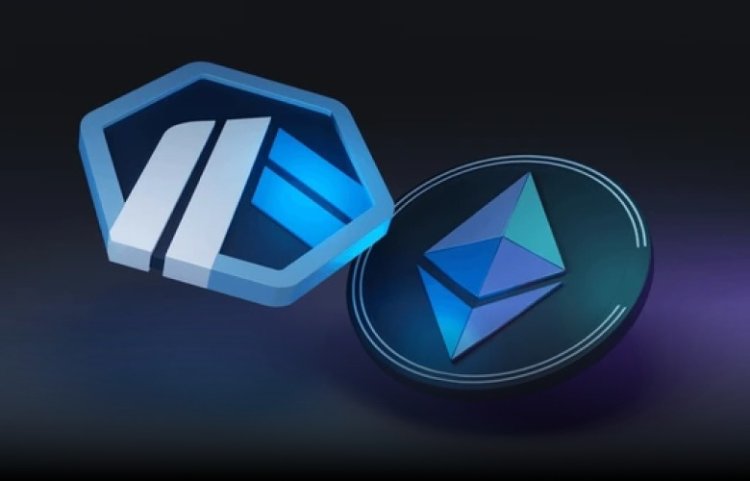Unleashing the Power of Ethereum Smart Contracts: Revolutionizing Decentralized Applications
Ethereum smart contracts operate on the principles of decentralization, transparency, and immutability. Once deployed to the Ethereum blockchain, a smart contract's code cannot be altered, providing a high level of security and trust in the execution of contractual agreements.

In the ever-evolving landscape of blockchain technology, Ethereum stands out as a pioneer, offering a versatile platform for the development of decentralised applications (DApps). At the heart of this groundbreaking ecosystem are Ethereum smart contracts – self-executing contracts with the ability to revolutionize the way we conduct transactions, establish trust, and build decentralized systems. In this article, we delve into the intricacies of Ethereum smart contracts, exploring their functionality, applications, and the impact they have on the broader blockchain and financial landscapes.
Understanding Ethereum Smart Contracts
Smart contracts on the Ethereum blockchain are self-executing programs that run on the Ethereum Virtual Machine (EVM). They are written in a high-level programming language called Solidity, which is specifically designed for creating smart contracts. These contracts are stored on the Ethereum blockchain and automatically execute when predefined conditions are met. In essence, they act as programmable agreements that automatically enforce and execute the terms of a contract without the need for intermediaries.
Ethereum smart contracts operate on the principles of decentralization, transparency, and immutability. Once deployed to the Ethereum blockchain, a smart contract's code cannot be altered, providing a high level of security and trust in the execution of contractual agreements. These features make Ethereum smart contracts an attractive option for a wide range of applications beyond just financial transactions.
Applications of Ethereum Smart Contracts
Decentralized Finance (DeFi):
- Ethereum smart contracts have played a pivotal role in the rise of decentralized finance. DeFi platforms leverage smart contracts to automate various financial services such as lending, borrowing, trading, and yield farming. Through the elimination of intermediaries, DeFi projects aim to provide more inclusive and efficient financial services globally.
Tokenization:
- Ethereum smart contracts enable the creation and management of tokens on the blockchain. This has given rise to the tokenization of assets, allowing for the representation of real-world assets like real estate, art, or commodities as digital tokens. Tokenization facilitates fractional ownership, increased liquidity, and easier transfer of ownership.
Supply Chain Management:
- Smart contracts can be employed to enhance transparency and traceability in supply chains. By automating the execution of agreements between different stakeholders, such as manufacturers, distributors, and retailers, Ethereum smart contracts can reduce fraud, errors, and inefficiencies in supply chain processes.
Identity Management:
- Decentralized identity solutions utilize Ethereum smart contracts to provide users with greater control over their personal information. Users can manage and authenticate their identity without relying on a central authority, offering improved privacy and security in digital identity management.
Governance Systems:
- Ethereum smart contracts are integral to the development of decentralized autonomous organizations (DAOs). These organizations leverage smart contracts for transparent and democratic decision-making processes, allowing token holders to participate in governance without the need for a central authority.
Challenges and Limitations
While Ethereum smart contracts offer numerous advantages, they are not without challenges. One significant concern is the potential for bugs or vulnerabilities in the code, leading to security breaches. High-profile incidents like the DAO hack in 2016 highlighted the importance of rigorous code auditing and continuous improvement in the smart contract development process.
Scalability is another challenge facing Ethereum. As the popularity of the network has grown, issues related to transaction speed and costs have emerged. Ethereum 2.0, an ongoing upgrade to the Ethereum network, aims to address these scalability issues by transitioning from a proof-of-work to a proof-of-stake consensus mechanism.
Additionally, the legal recognition of smart contracts varies across jurisdictions. While the self-executing nature of smart contracts can enhance efficiency, legal frameworks must evolve to accommodate these technological advancements and provide a clear legal standing for smart contract agreements.
The Future of Ethereum Smart Contracts
As Ethereum continues to evolve, the future of smart contracts looks promising. Ethereum 2.0, with its focus on scalability, sustainability, and improved security, is expected to further enhance the capabilities of smart contracts on the network. Layer 2 scaling solutions, such as Optimistic Rollups and zk-Rollups, aim to alleviate congestion on the Ethereum mainnet and reduce transaction costs.
Interoperability is also a key area of development. Efforts like the Ethereum Virtual Machine-compatible chains and bridges with other blockchains seek to create a more connected and interoperable blockchain ecosystem, allowing for seamless interaction between different blockchain networks.
Moreover, ongoing research and development in the field of formal verification, a process that mathematically proves the correctness of smart contract code, aim to enhance the security of smart contracts and minimize the risk of vulnerabilities.
Conclusion
Ethereum smart contracts have undeniably ushered in a new era of decentralized and programmable applications. Their impact extends far beyond simple financial transactions, reaching into supply chain management, identity verification, and governance systems. While challenges such as security vulnerabilities and scalability concerns persist, ongoing developments in Ethereum 2.0 and other scaling solutions signal a promising future for the technology.
As the broader blockchain ecosystem continues to evolve, Ethereum smart contracts remain at the forefront of innovation, paving the way for a decentralized and trustless future. As developers, businesses, and users continue to explore the limitless possibilities of smart contracts, Ethereum stands as a testament to the transformative power of blockchain technology. The journey is ongoing, and the true potential of Ethereum smart contracts is yet to be fully realized in the ever-expanding landscape of decentralized applications.
What's Your Reaction?















